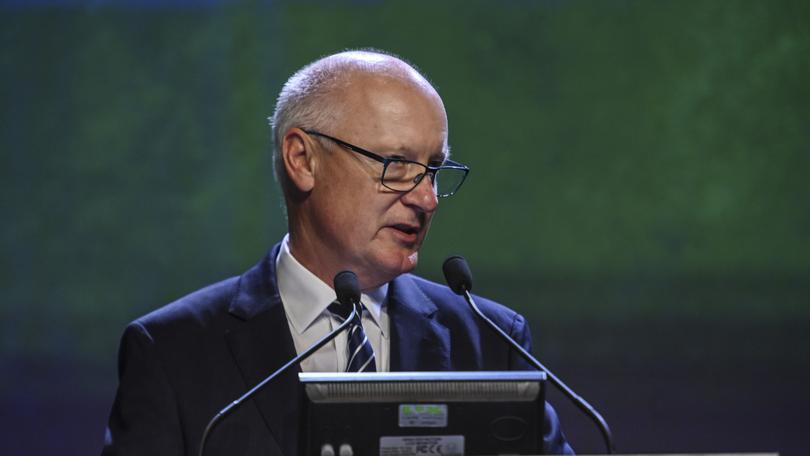Richard Goyder returns fire on Woodside Energy proxy adviser
The oil and gas company chair has questioned the logic behind CGI Glass Lewis’ recommendation that shareholders vote against his re-election.

Woodside Energy chair Richard Goyder has questioned the independence of influential proxy adviser CGI Glass Lewis after it recommended its major investor clients vote against his board re-election.
Mr Goyder admits to being puzzled by CGI’s voting guide for the April 24 annual general meeting, which also urges shareholders to reject Woodside’s climate transition action plan.
“Proxy advisers should be independent. They (CGI) are certainly not looking objectively at either the climate action report or my re-election as a director,” the prominent WA director told The Nightly.
Sign up to The Nightly's newsletters.
Get the first look at the digital newspaper, curated daily stories and breaking headlines delivered to your inbox.
By continuing you agree to our Terms and Privacy Policy.Mr Goyder also questioned CGI’s claim, echoed by climate activist groups, that Woodside had been persistently unresponsive to investor concerns about its decarbonisation strategy.
On Woodside’s numbers, it has held as many as 200 meetings with investors since the beginning of 2023, including dozens attended by Mr Goyder.
“If that’s not responsive, I’m not sure what is,” Mr Goyder said on Friday.
He said CGI should judge his record in its entirety, not just on Woodside’s energy transition strategy.
“If you are going to vote against the climate action plan, there needs to be some substance and logic behind it, and I should be measured and tested against my performance as chairman of Woodside,” he said.
He said any assessment of his five years at the helm should also recognise “CEO transition, board renewal, the BHP Petroleum merger and total shareholder returns”.
“I think it’s not a bad record,” Mr Goyder said.
The AGM has become an annual showdown between the company and climate activists who are sceptical of its commitment to decarbonisation and oppose the development of new fossil fuel projects.
Mr Goyder on Friday again backed in Woodside’s strategy, which includes a focus on gas as a bridging fuel in the transition to clean energy.
“We are not going to change our strategy. It’s a good strategy based around performing, maintaining disciplined capital allocation and retaining the confidence of capital markets,” he said.
Woodside’s climate plan attracted a protest vote of 49 per cent when it was last put to a shareholder vote two years ago.
The company has since revised the plan after what it insists was extensive engagement, telling shareholders in last month’s AGM notice that the updated strategy “reflects and responds to investor feedback”
“It represents a material step forward from our previous disclosures and clearly articulates our plan to reduce our net equity Scope 1 and 2 emissions and invest in products and services for the energy transition,” it said.
However, activists see this year’s climate plan vote and Mr Goyder’s re-election as an opportunity to turn up the heat on Woodside.
The impact of the CGI recommendation won’t be known until days out from the meeting. Its advice will sway some of its clients, but other institutional shareholders will make their own call on the basis of separate analysis.
The campaign against Mr Goyder’s re-election has been led by activist investor the Australasian Centre of Corporate Responsibility, arguably Woodside’s biggest critic, which has also urged shareholders to vote against the company’s remuneration report.
Woodside has consistently countered criticism of Mr Goyder by saying its chair is “a highly capable and effective leader, and continues to provide valuable insight, strength and stewardship to the board and its deliberations generally”.
CGI’s voting report, however, expressed concern about “the board’s inability to establish a credible case for its understanding and responsiveness to shareholders’ views”.
“The board has not outlined the specific deficiencies in the plan that were highlighted by shareholder feedback, nor how it intends to alleviate shareholders’ concerns in those areas, if possible,” CGI said in recommending against the climate plan.
“We believe that the chair of the board should be held accountable for the track record of dismissing shareholder opposition, and the ongoing lack of sufficient disclosure enabling a meaningful assessment of the company’s response to this opposition.”
